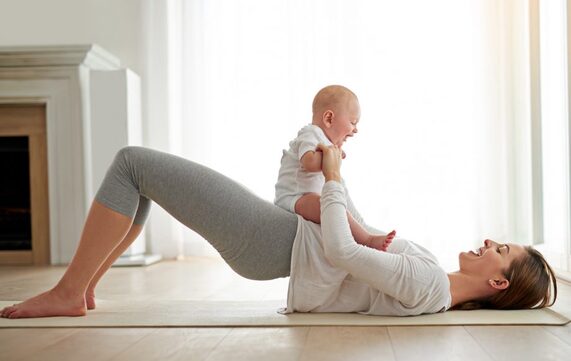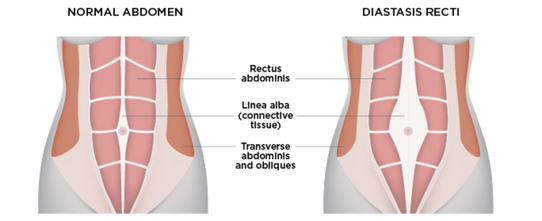|
Each and every birth is different which also means each Mother’s return to exercise and postnatal recovery will be different too. It is important to check in with your health professional before returning to exercise, ideally this would be a women’s health physio. How long should I wait? There is no one rule that fits all in this circumstance but the general guidelines will differ significantly depending on what type of birth you have. It also depends on what your exercise levels were before giving birth. Vaginal Birth: It is safe to start doing very gentle pelvic floor exercises and slow walks a few days after birth, although more vigorous based exercise should be avoided until after your 6 week check up. Once cleared to resume exercise you should not be exercising at full, pre-birth intensities until around 16 weeks postpartum. Caesarean Birth: As a Caesarean is a major operation it will take at least 6 weeks for tissues to heal. Gentle pelvic floor exercises can be done a few days after birth but gentle low impact aerobic exercise should be done 6-8 weeks postpartum. High impact exercise and heavy weights should be avoided until 3-4 months postpartum once scar tissue has fully healed. Why is exercise beneficial for new Mum’s? Whilst everyone benefits from regular exercise there are some additional benefits for new Mum’s, which include but are not limited too;
What pregnancy changes might affect my ability to exercise postpartum? The female body is amazing and goes through many changes over the course of pregnancy, birth and postpartum. During pregnancy and labour our hormone levels are at an all time high and this can affect your joints and ligaments for up to 6 months afterwards. This highlights why it is important to ease back into exercise even if you are feeling great. During your pregnancy your abdominal muscles may have separated causing Diastus Recti. This can have long term effects if not treated correctly in its early stages and will determine what types of exercises are safe to be doing. The Pelvic Floor is made up of muscles and ligaments that support the bladder, uterus and bowel. This can be weakened during labour, particularly if you had a vaginal birth. Regular pelvic floor exercise can help to strengthen the area and prevent prolapse and leaky bladder in the future. What type of exercise should I be doing?
Low impact exercise will be the best place to start postpartum. In the first few days after birth, focusing on resting and caring for your newborn baby is most important. Some gentle pelvic floor exercises can be done. Think about Squeezing and lifting the muscles around your Vagina as you are trying to hold in a wee, try holding this for 5-8 seconds and then fully relax. Other low-impact exercises that maye suitable include;
Try starting small by incorporating short bouts of exercise into your day. For example walk with the pram down to the shops, think about doing your pelvic floor exercises whilst feeding your baby, etc. Before returning to any exercise postpartum it is important to consult your health professional first and go at your own pace. Written by, Aleisha Michael Accredited Exercise Physiologist.
0 Comments
 It is a normal thing to feel stress in this day and age due to the constant fast pace of our lives! But it is important to realise when we are in a constant state of stress and the negative impacts this can begin to have on our bodies. What happens to our body when we are stressed? Stress can affect every organ and system in your body, meaning it can cause more than just a restless night sleep if we are constantly experiencing chronic stress. We will discuss the stages that each of your systems go through when experiencing stress and the long term impacts it can begin to have for you. Initial signs: Most of us have experienced stress at one point or another and can recognise the initial signs that may present. This can include headaches, muscle tightness (particularly around the neck and shoulders), being unable to focus, your mind racing or even flutters in your chest. These are all indicators of the things occurring deeper within each of your crucial systems such as the nervous, circulatory, digestive and immune systems. Circulatory System: Stress causes your heart rate to spike which as a result also increases your blood pressure. Most people’s hearts recover relatively quickly from this when the stress hormone, Cortisol level’s returns to normal again. When you experience long term periods of stress it can result in more chronic conditions such as cardiomyopathy to result. This condition is often known as the broken heart syndrome and can often occur after severe physical or emotional stress, causing the heart’s left ventricle (the pumping chamber) to weaken. Hormones: As we have mentioned stress occurs as a response to an increase in the hormone, cortisol. There are also increases in adrenaline and epinephrine within the body when stress occurs and this can affect our sleep, explaining why we can struggle to get a restful night. The combination of these hormones also increases an individual’s likelihood of having a stroke, heart attack, high blood pressure or even developing anxiety and depression. Digestive system: Besides experiencing some butterflies in your tummy when you become stressed or overwhelmed, stress can have many negative side effects on our digestive tract. Our digestive tract is filled with nerve endings and immune cells which are heavily impacted by the hormones released when we are stressed. This can cause symptoms and conditions like acid reflux, irritable bowel syndrome and inflammatory bowel disease to develop. Brain function: Studies have found that those who experience chronic stress have more activity in the amygdala brain region which is associated with fear and emotion. It can even affect how the brain processes information and negatively impact your cognition and attention levels, explaining why it can be hard to focus or learn new things when you are experiencing stress. Immune function: I’m sure you have all experienced it, that at the most crucial time at work, when Uni exams are approaching or on the first day of your holidays, you come down with a dreaded cold. This is due to your stress levels being high for so long leading up to these events that your immune system has weakened as a result. 3 tips to decrease your stress.
By Aleisha Michael Accredited Exercise Physiologist |
AuthorSLisa Parkinson Archives
July 2024
Categories
All
|



 RSS Feed
RSS Feed